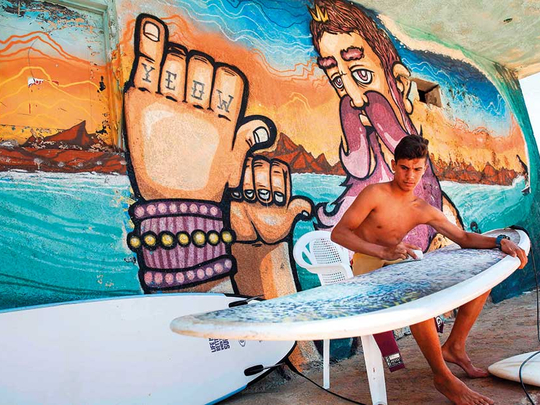
Jiyeh, Lebanon: Ali Qasim had never seen the sea before he fled his home in Syria for Lebanon, but now he’s a regular in the waves and dreams of his own surf school.
Dressed in a purple wetsuit, the 17-year-old coats his surfboard with wax and smears sunscreen on his face before dashing into the sea.
He disappears behind one wave and another until his small figure is barely visible from the beach at all, as though he was headed for the horizon.
“When I’m on my board, I feel free. I feel like I’m in another life,” the teenager says shyly at a beach in Jiyeh, 30 kilometres south of Beirut.
Qasim is from Aleppo city, though he says he remembers little from his childhood in Syria.
His father has worked in Jiyeh for the past 25 years, and after Syria’s conflict erupted in March 2011, he decided to bring his family to Lebanon as well.
Qasim has two brothers and three sisters, but speaks little about his family and his life before he became a refugee.
A third brother died in the conflict. “He was killed in Aleppo at the beginning of the war”, he says, without giving more details.
His life now is dominated by surfing.
“Surfing is like an art. It allows me to express my personality,” he says.
“I become someone else. I have more confidence in myself.”
Qasim’s entry into surfing came through Ali Al Amine, who became his mentor after meeting him in 2015.
At the sandy Jiyeh beach, a popular spot for surfers, Al Amine spotted Qasim trying his luck in the waves with a makeshift board.
“He was trying to surf with a piece of polystyrene he had cut into a plank shape,” says Al Amine, who runs a surf school in Jiyeh.
“He was very thin and wearing nothing but shorts. I was afraid he would drown,” he says.
But after watching him for a few minutes, Al Amine’s fears began to recede.
“He knew exactly what he was doing,” he says.
Qasim had spent long hours observing surfers in the water at Jiyeh before deciding to try himself.
“I didn’t know this sport existed. The first time I saw the surfers, I wanted to try it,” he says with a smile.
Al Amine decided to take Qasim under his wing, offering him a spot at his surf school and giving him a wetsuit and surfboard “on the condition he was good in class and behaved with his parents”.
And two years later, the guidance has borne fruit, says Al Amine, who considers Qasim like “a son”.
“He’s better than some people who have been surfing for years,” he says.
Qasim has stuck with the sport, convinced it can help him “build a better life”.
During the summer, he works at Al Amine’s school, repairing boards, welcoming customers and helping during lessons.
The job provides income that helps his family, along with his father’s wages and support from the UN refugee agency.
“My family really supports me in surfing. They have no problem with it,” he says.
“Right now I’m teaching my younger brother how to surf, and I’m going to teach my younger sister as well.”
Qasim says he has become used to life in Lebanon, but he still dreams of returning home.
His ultimate goal is “to become the first professional surfer in Syria and open a surf school in Latakia when the war is over”.
Latakia is a popular seaside destination, and a government stronghold that has been largely spared the worst ravages of Syria’s conflict, which has killed more than 320,000 people.
The International Surfing Association does not so far count a Syrian surf school among its members, and to help Qasim achieve his goal, Al Amine has started a campaign on the GoFundMe crowdfunding platform.
The school project might still be far off, but Qasim already has a name for it: “It will be called Surf Syria,” he says.












